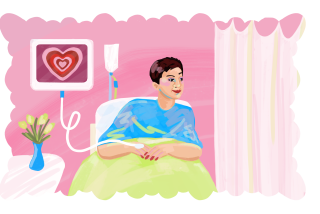Sometimes, Modesty Is No Virtue at All
- Share via
Edna, a 68-year-old retired schoolteacher from the Midwest, came to our hospital a few months back complaining of horrible shoulder pain. An intern carefully examined her shoulder but had difficulty performing a complete examination because the patient refused to take off her clothes and put on a hospital gown.
Just before finishing an otherwise uneventful exam, the intern, who was exhausted after working a 24-hour shift, decided to feel Edna’s armpit. There, she discovered some large lymph nodes, often an indication of cancer. The intern told Edna of the enlarged nodes and explained that she would like to examine her upper arm and chest. Edna refused.
“I’m fine, I’m fine,” Edna insisted.
At this point, the intern called me in, and together with a nurse we finally convinced Edna to let me examine her upper arm. I gently lifted her blouse, and found three bandages, with dried blood on them, wrapped around her body. I asked Edna what was under the bandages.
“Oh, that? It’s nothing--just a small sore,” she said. “I think it’s getting much better.”
With further prodding, Edna reluctantly allowed the nurse to undo the bandages. When they came off, I found myself facing the largest breast cancer I’ve ever seen--a huge tumor, larger than a grapefruit, protruding from her right breast.
The nurse and I looked at each other, then at the tears in our patient’s eyes. Edna spoke first. “Why did you do that? I’m fine. I didn’t want....” Her words trailed off.
I apologized--I suppose for discovering what Edna wanted to keep secret.
“Do you know what’s happening here?” I asked. After a few moments she replied, “Sort of.” Her eyes lowered and she was silent for a minute. “It’s something bad, isn’t it?”
“Yes, I think it is,” I replied. It was very bad. A breast cancer so advanced it had invaded her bone.
That same week, John, a construction worker in his mid-50s, came to see me. For the first time in the eight years he had been my patient, John brought along his wife to the appointment.
“So, how are you doing?” I asked as I entered the exam room. No reply.
Finally, John’s wife told me that her husband had found blood in his stool.
Eventually, I learned that John had been experiencing symptoms for more than four months without telling anyone. He only made a doctor’s appointment after his wife found out. John said he had not sought care because he did not want to waste my time. His wife clarified the issue: Her husband, she said, was just too embarrassed to discuss his stools with a stranger.
Even the most sophisticated diagnostic tools are rendered useless by denial and embarrassment. Patients in denial about their symptoms may neglect to even make a doctor’s appointment. And those too embarrassed to ask a personal question may fail to share information that could alert their doctor to a serious condition. These behaviors, in turn, can delay treatment and increase the severity and duration of illness.
There is a host of dangerous but treatable ailments that require discussing private body parts or conditions. Our reaction is to not tell anyone, including our doctor, because of our discomfort. Embarrassment can prevent a domestic violence victim from seeking help. It can cause a couple to subject themselves to expensive, invasive infertility treatments rather than admit that they just aren’t having sex. Or result in a mildly forgetful older person not talking with a doctor because he fears Alzheimer’s disease, when in fact he is just a bit absent-minded.
Unfortunately, patients are not the only ones who get embarrassed. Many times doctors hesitate to ask patients difficult questions because we feel uncomfortable talking about sexual behaviors, spousal relationships, substance abuse or the observed memory loss in a patient. Most of the time this discomfort derives from our own personal discomfort with the topic. Discussions of sexual behaviors, drug use or socially undesirable behaviors often expose our own raw feelings based on beliefs from our background, our culture or how we were brought up.
As medical students go through the rigors of training they acquire new knowledge focusing on diseases or bodily organs; they learn to perform a myriad of procedures, and they gain social status. But they often lose their ability to relate to ordinary people. Whether the embarrassment stems from the doctor or the patient, when it interferes with honest, open discussion, its consequences can be deadly.
*
Michael Wilkes, an internist, is the vice dean for education at UC Davis School of Medicine.
More to Read
Sign up for Essential California
The most important California stories and recommendations in your inbox every morning.
You may occasionally receive promotional content from the Los Angeles Times.












